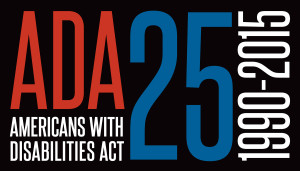Twenty-five years ago, on July 26, 1990, the Americans with Disabilities Act (ADA) was signed into law to ensure that individuals with disabilities have equal opportunity to participate in the mainstream of American life. As we celebrate the twenty-fifth anniversary of the ADA, writes Benetech President, Betsy Beaumon, it is imperative to consider not only how far we have come in eliminating discrimination against people with disabilities, but also how to extend the ADA promise to a new generation of Americans, particularly in the education field.
In her op-ed, Beaumon argues that the digital revolution could usher in a golden age of equality and improved  educational opportunities for all students, including those with disabilities, but that in order to make inclusive education a reality, students with disabilities must be considered in the design requirements of any new education technology.
educational opportunities for all students, including those with disabilities, but that in order to make inclusive education a reality, students with disabilities must be considered in the design requirements of any new education technology.
Thanks to rapid technological progress and to legislation like the ADA, notes Beaumon, who is an authority on digital accessible materials in education, it is now possible to have books and curricula that are “born digital” also “born accessible” for all learners, as an integral part of the development or publishing process. “The 25th anniversary of the ADA,” she claims, “is a reminder that, at their best, policy and legislation support technological advances as well as benefits to society. We now need such balanced laws more than ever in order to stay committed to core principles of inclusion in the midst of massive technological change.”
Read Betsy Beaumon’s complete op-ed on the Benetech website.

Be First to Comment